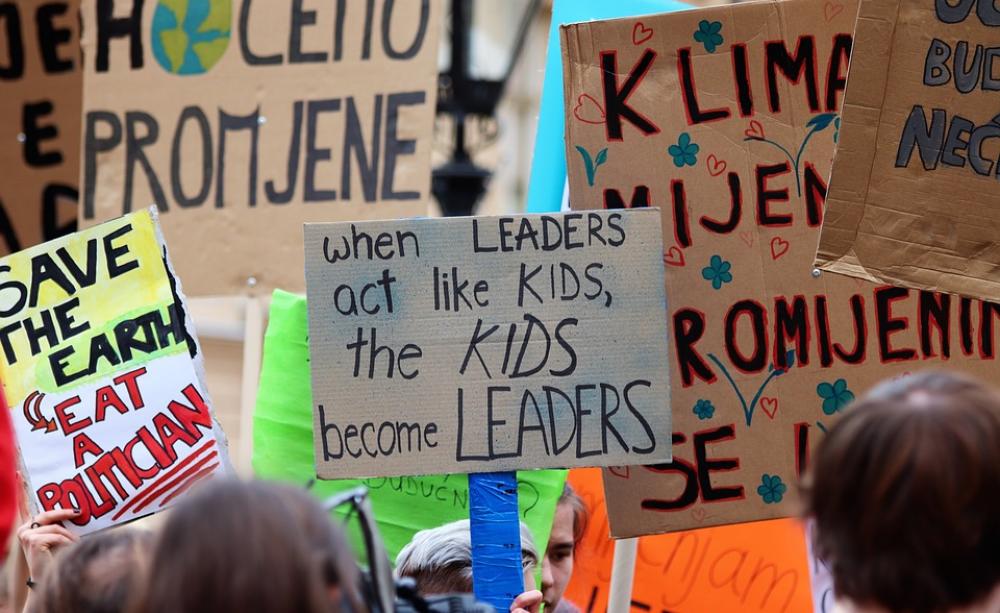If sheer enthusiasm can deliver ‘another world’, the opening rally of the World Social Forum in Tunis on 24th March held much promise. Thousands of women and men, young and old, vociferous and quiet, a colourful multitude of sloganeering, banner-holding, dancing and singing braved rain and well-below expected temperatures to march from the historic Bab Sadoun to the iconic Bardo Museum. The fact that this rally came just a week after the horrific attack on visitors and workers in this museum, killing 21, was itself highly symbolic. The Forum organisers were quick to not only denounce the attack, but also announce that the Forum would proceed as scheduled in a mark of solidarity with all peace-loving Tunisians, and in celebration of the remarkable revolution wrought by the country’s youth and workers as the first uprising of the Arab Spring.
Over 4 days, about 70,000 people from over 4000 movements or organisations are reported to have thronged the Forum in the sprawling El Manar University, with participation from every possible cause one could think of, and then some. Feminists of various persuasions, ecologists and environmentalists, climate justice and peace warriors (does that sound contradictory?), those seeking spiritual engagement, recyclers and upcyclers, proponents of the commons, free-the-internet hackers, Palestine supporters and anti-imperialism activists, peasant and indigenous peoples’ and worker movements, anti-discrimination fronts, global citizenship proponents, community health workers, poverty eradication and food sovereignty groups, the global movement against corporate impunity, alternative learning and education practitioners; you name it, they were there.
Unfortunately, with hundreds of events taking place over these 4 days, there was no way anyone could have got more than a glimpse of the Forum. I for one was dedicated to two events relating to the search for systemic change, and got no chance to participate elsewhere. But these two events themselves encompassed significant diversity, possibly forming a tiny microcosm of the Forum.
The first, somewhat ambitiously named ‘Towards a World Citizens’ Movement’, brought together about 200 civil society members and movement activists from various countries.Organised by several civil society groups and networks including CIVICUS, Action/2015, GCAP, and CONCORD/DEEEP, this was a continuation of a 2-3 year process of bringing together practitioners and thinkers advocating transformations towards sustainability and equity. It was an interesting convergence (and at times divergence!) of perspectives and experiences from labour activism to spiritual living, from deschoolers and adult education proponents to activist artists, from climate justice activists to poverty eradicators, from degrowth advocates to youth revolutionaries (several from Tunisia!), and many many more. But there were also conspicuous absentees, such as the global movements of small peasants, fishers and indigenous peoples (e.g. Via Campesina), or of workers and trade unions; with humility several in the gathering noted that a world citizens’ movement has to be led by such peoples’ movements and not by NGOs, the latter needing to take a facilitative, supportive role.
My second event was much smaller, only about 20 participants. ‘Radical Well-being Alternatives to Development’, organized by Kalpavriksh, the Global Diversity Foundation, the Centre for Environment and Development, and SADED, made up in quality what it lacked in quantity. Panelists and participants described a range of inspiring examples of communities, civil society or others achieving positive change. Such initiatives, combined with peoples’ resistance to destructive projects and landgrab, are yielding diverse approaches to well-being, some ancient (like buen vivir and sumak kawsay in Latin America, ubuntu in southern Africa, and swaraj in South Asia), some very new (like Degrowth in Europe, and Radical Ecological Democracy in South Asia).
Leah Temper described the resistance to pipelines and the move to claim sovereignty over traditional territories by First Nations in Canada. This has reinforced the policy of seeking prior and informed consent from communities when their interests are threatened, and the judiciary upholding oral accounts as valid testimony for establishing inalienable rights. She mentioned that the Environmental Justice Atlas coordinated by Autonomous University of Barcelona has been useful in mapping and making accessible accounts of environmental conflicts and resistance movements.
Uchita de Zoysa described how community and civil society efforts after the 2007 tsunami in Sri Lanka were successful in making the state accountable to its relief and reconstruction responsibilities, but also in maintaining the coast as part of the commons in the face of privatization threats. From such local initiatives to a global level was the move to forge 14 Peoples’ Sustainability Treaties, coming together at the Rio+20 conference.
Gary Martin pointed to the Moroccan concept of agdal, the collective management of the commons. A manifestation of this is the initiative to provide culturally appropriate education opportunities to girls from traditional communities in dartaliba (girl houses) where they can live and study collectively, with a mix of Amazari (their traditional language) and Arabic, helping them avoid the alienation taking place in mainstream educational institutions.
Patrick Bond described how in South Africa, some recent transformations have occurred in the successful struggle to make generic AIDS medicines available to the affected population, defeating US pharmaceutical company attempts to retain their private IPR stranglehold; and in the struggle for ‘commoning’ water and electricity in Soweto, Johannesburg.
I spoke about the struggle for direct democracy by Mendha-Lekha, an adivasi (indigenous) village in central India, which has practiced self-rule, conservation of its surrounding forests, sustainable harvesting of forest produce, and the use of resulting revenues for full livelihood, water, and energy security. It has also converted all its private agricultural land to the village commons.
In southern India an organization of dalit women farmers, Deccan Development Society, has achieved food sovereignty by organic cultivation of traditional seed diversity, linking this to a public distribution system for the poor and to urban consumers. The women have also become film-makers, run a community radio, and manage a school where children are exposed to both traditional and modern knowledge systems. A global network of peoples and communities are trying to promote such local governance of nature and natural resources, through Indigenous Peoples’ and Community Conserved Territories and Areas.
Aseem Shrivastava spoke of the successful mobilization of farmers in western India against attempted land acquisition by one of the country’s most powerful corporations, Reliance. Jai Naidoo gave a brief historical perspective of the anti-apartheid and workers’ struggles in South Africa, with the major lesson that if revolutions are to happen, they will only be by and with ‘common’ people. Ruby van der Wekken described her involvement in demonetization, local currency, and other community exchange initiatives in Finland. Omar Sbei described an inspiring example from Tunisia, of workers at an oasis taking over control (its private owner being absent), democratically managing it, and putting back revenues from dates into a school, health clinic, and other community facilities. In India the Vikalp Sangam or Alternatives Confluences is a process of converging such initiatives and social movements for mutual learning and collaboration, and building a framework or paradigm of a sustainable and just society.
At more global level there are a number of initiatives, including on documenting and/or mapping local alternatives, on challenging conventional economic paradigms and proposing radical new ones such as the alternatives to development in Latin America arising from worldviews like Buen Vivir and Sumac Kawsay, the Degrowth movement in Europe, Solidarity Economy and Transition initiatives in North America and Europe, and the dialogue on Radical Ecological Democracy.
As a participant of mainly these two events, it was not possible for me to get a sense of whether the rest of the WSF was indeed helping move us towards the promise of ‘another world is possible’. One view holds that the deliberately eclectic, almost anarchic space of the WSF is not conducive to cohesive convergence of perspectives and political mobilization, and so it is not a transformative process; another view holds that precisely because of this nature, it has the ability to attract enormously diverse movements and groups but still within an overall framework of justice and sustainability and that this in the long run is more transformative than trying to forge consensus through political declarations.
At the Tunis WSF there was some attempt made to host ‘convergence assemblies’ to bring people together, and a final session of open mingling and some common messages, which may be a step towards making it a more transformative process while retaining openness. There was considerable synergy between the movements demanding an end to corporate dominance and impunity, those fighting for climate justice, and women’s movement groups. The language of alternatives from various parts of the world also seemed to get significant traction in the convergence assemblies. Facilities to record one’s initiatives and continue the discussion, and a new process called the Internet Social Forum that enables such sharing and attempts to free the internet of state and corporate control, will aid in bringing movements together. But someone else who was able to participate in a greater number of events and in the final sessions, can reflect better on these issues. For me, being able to dialogue and interact with a diversity of activists and practitioners and thinkers on the issue of radical well-being alternatives, was itself well worth the long haul to Tunis. Not to mention being able to get a tiny glimpse at how youth can indeed be a revolutionary force.

School climate strikers in Edinburgh demanded unity and action. My decision to attend and support the Edinburgh School Strike, like my arrival, was late. As I left Waverley Station I listened intently for the sound of protest but the city gave up only its regular sounds; the beat and grind of petrol and diesel engines busy pumping out their invisible death, the whoosh of air b...

Growth-critical authors and advocates of a post-growth society are often criticized on the grounds that some of their arguments appear open to appropriation by authoritarian nationalist and nativist racist forces. As such objections are often made in a polemical and overly generalised manner, often ultimately aiming to delegitimize growth-critical ideas as a whole, those being criticised often ...
Shortly before the start of the Climate Camp and the Degrowth Summer School, we are changing the venue of our camp. We have found an even better place in close proximity to the open cast mine Garzweiler. Further information is available here